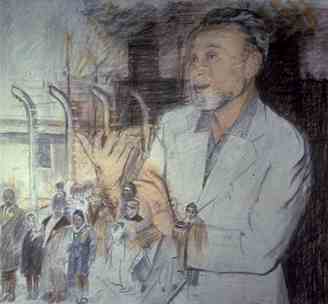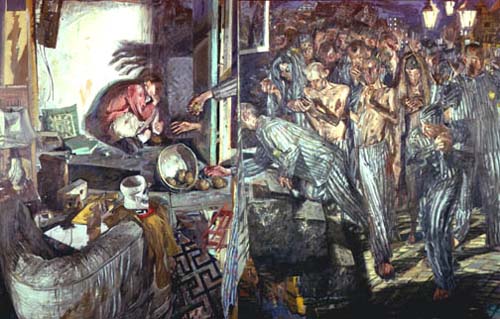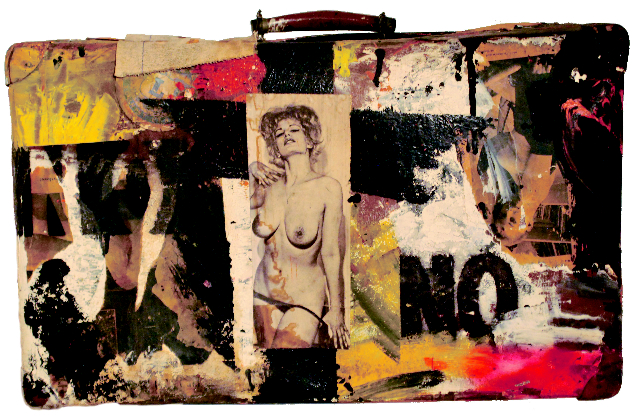We are dealing with unavoidable traumatic effects; actual and not idealized fancified tragedies and catastrophes. We don’t need T.S. Eliot preaching how low we have sunk. It was the trial run of eugenics, Fabianism, H.G. Wells, George Bernard Shaw and it went terribly wrong. Technology, science and death is a bad combination. The feelings and sensations of the survivors of the holocaust can never be purged. There will always be bile at the bottom of the gut. And how could it be otherwise after centuries of bourgeois ideology masquerading as the high status of lofty theory, basically, occult principles permeating all the social arts and infecting them with an insidious materialist perspective. The flood of history in all its potentials is constantly running into the dams and dikes created by these phony philosophers, priests, law enforcers, judiciary etc., our paragons of good taste.

---Primo Levi: Witness Drawing,1988 Pencil and color pencil on paper 26 1/2 x 28 1/2 Levi, a survivor from Turin, Italy, has written one of the strongest Holocaust memoirs, If This is A Man: Survival In Aushwitz, as well as poetry that deals with the horror of the Holocaust. He committed suicide in 1987.--- Read More:http://chgs.umn.edu/museum/exhibitions/witnessLeg/empathizers/rivers/
( see link at end) : “To the Victims of the Holocaust,” where Layton writes: “I live among the blind, the deaf, and the dumb / I live among amnesiacs.” The premise of this poem is the forgetfulness of others and the corrosive silence in regards to Nazi atrocities. Layton appoints himself as the sole bearer of memory, compelled to speak in defence of the dead. He continues:
My murdered kin
let me be your parched and swollen tongue
uttering the maledictions
bullets and gas silenced on your lips.
Fill, fill my ears with your direst curses.
I shall tongue them, unappeasable shades, till the sun turns black in the sky….

---a German girl cowers in her room, as a line of hungry concentration camp victims reach into it -- one hand breaks through a wall -- for the few potatoes she has placed by an open window. They cherish the humble potato, a typical German food, as though it was the substance of life, which indeed it is for them. --- Read More:http://www.artnet.com/magazine/reviews/kuspit/kuspit7-18-00.asp
…Aligning himself with the murdered victims, Layton grants himself a privileged position from which to claim the voices of the dead as his own. Yet this poem betokens Layton’s own fury more than it gives a voice to the past. Layton is a man given to cursing, and here the shades of the dead howl in his own tongue. The rage in this poem is a response to history, not an attempt to recognize and recover its multiplicity.
There is a sameness imposed on the dead, culling their number to an ambiguous “your.” Within the confines of his own poetic intent, Layton has his ghosts all rattle with the same furious voice. What Layton refuses to address in his poetry is the inexpressibility of another’s suffering, a topic returned to repeatedly by survivors of the Holocaust. This point was particularly central to the Austrian essayist Jean Amery. In an essay concerning his torture at the hands of the Nazis after his arrest for work with the Belgian resistance, Amery writes:
Qualities of feeling are as incomparable as they are indescribable. They mark the limit of the capacity of language to communicate. If someone wanted to impart his physical pain, he would have to be forced to inflict it and thereby become a torturer himself

---Many Jews felt that the Holocaust indicated that God had abandoned the Jews, and they abandoned God in response: holiness has fled the world, leaving only the profane—profane human beings, which is why Lurie never abandoned the figure. Lurie’s art deals in profanities—the profaneness of it all. He curses it all, as his Curse Paintings suggest. There is nothing “high” about art, for there is nothing up high. Art is forced to get low down and dirty because the world is lowdown and dirty. Nietzsche famously declared “God is dead,” and with him morality. Human beings can mistreat each other without repenting. The Holocaust and pornography prove the point. Newman couldn’t accept the truth of Nietzsche’s insight, but Lurie’s art, with its obsessive insistence on pornography and the Holocaust—both horrors for Lurie, which is why sometimes pornographic pin-ups and Nazi insignia appear in the same picture, each reinforcing the monstrous meaning of the other--shows its accuracy. ---Read More:http://borislurieart.org/book/export/html/55
So, the problem is the dead can never communicate the experience of their demise and the use of language invokes the necessity of hanging words onto symbols, and symbols no matter the efforts of deconstructions, of Roland barthing them to death,still end up serving as demaracations of memory; boundaries that attempt to speak for the dead, boundaries that group the demolition of the individual into categories. There is an inadequacy of language in confrontation with Auschwitz. If we didn’t have eyes to see, it would still hang in the air, palpable but ill defined and amorphous. And to preserve the integrity of memory is a self defeating paradox, or at least one with frightening limitations of commemorative possibilities. Ultimate failure. The sum of the destructions does not equate with rational or even incoherent explication. The concept of memory itself seems intrinsically compromised, as if infected with a parasite, a trickster from the first impression.
…Amery’s intention is not that the project of memory be abandoned as a consequence of this reality. Indeed, insisting that the Holocaust be remembered is central to Amery’s desire for moral recovery. However, Amery maintains that retaining the memory of the Holocaust is something essentially ungraspable. One cannot experience the blow inflicted on another or relive his death. Rather, what one is left with in remembering the Holocaust is a series of acknowledged absences. One may commemorate these absences but not attempt to occupy them, as they are filled already with eradicated peoples, landscapes, and histories.Read More:
://web2.concordia.ca/canadianjewishjournal/pdf/DylanFinalDraft2.pdfADDENDUM:
The extent of the barbarism was not fully evident until the post-War period, inspiring Bertold Brecht to note that the “mansion of culture” was made of “shit.” The world, shocked by photographic and documentary evidence of death on an industrial scale wondered incredulously how the nation that nurtured Kant and Hegel and Beethoven could have systematically slaughtered over six million human beings. How from this peak of culture could the society sink to these depths of barbarism? The Enlightenment had failed, having produced positivism. Positivism, a degraded form of the Enlightenment, created an administered society that led to totalitarianism. Fascism was administered and highly controlled capitalism that revealed the contradictions inherent in the Enlightenment. Fascism put into practice the inherent self-destructiveness of the Enlightenment.Read More:http://www.arthistoryunstuffed.com/tag/max-horkheimer/ …
…Subjecthood is achieved through the domination of the other. Humans become “human” through culture, which denies and deforms nature. Science is the ultimate expression of the (in) human drive to subjugate nature through culture (technology), a drive that reached its peak with the Holocaust and the technology of Death.
That which was Jewish would be expelled from the purity of the Nazi body politic. Through subjective domination, Jews became objectified through reification. To counter this domination of nature, the Nazis had to regress to the mythic past and progress spawned barbarism. The humanity of the Jews was “forgotten,” because as Adorno said, “…all reification is a forgetting…” and even democratic countries produce forgetting through the culture industry. All levels of culture are permeated with this process of commodification that reduces people to things to be assimilated or purged. ( ibid.)





 COMMENTS
COMMENTS